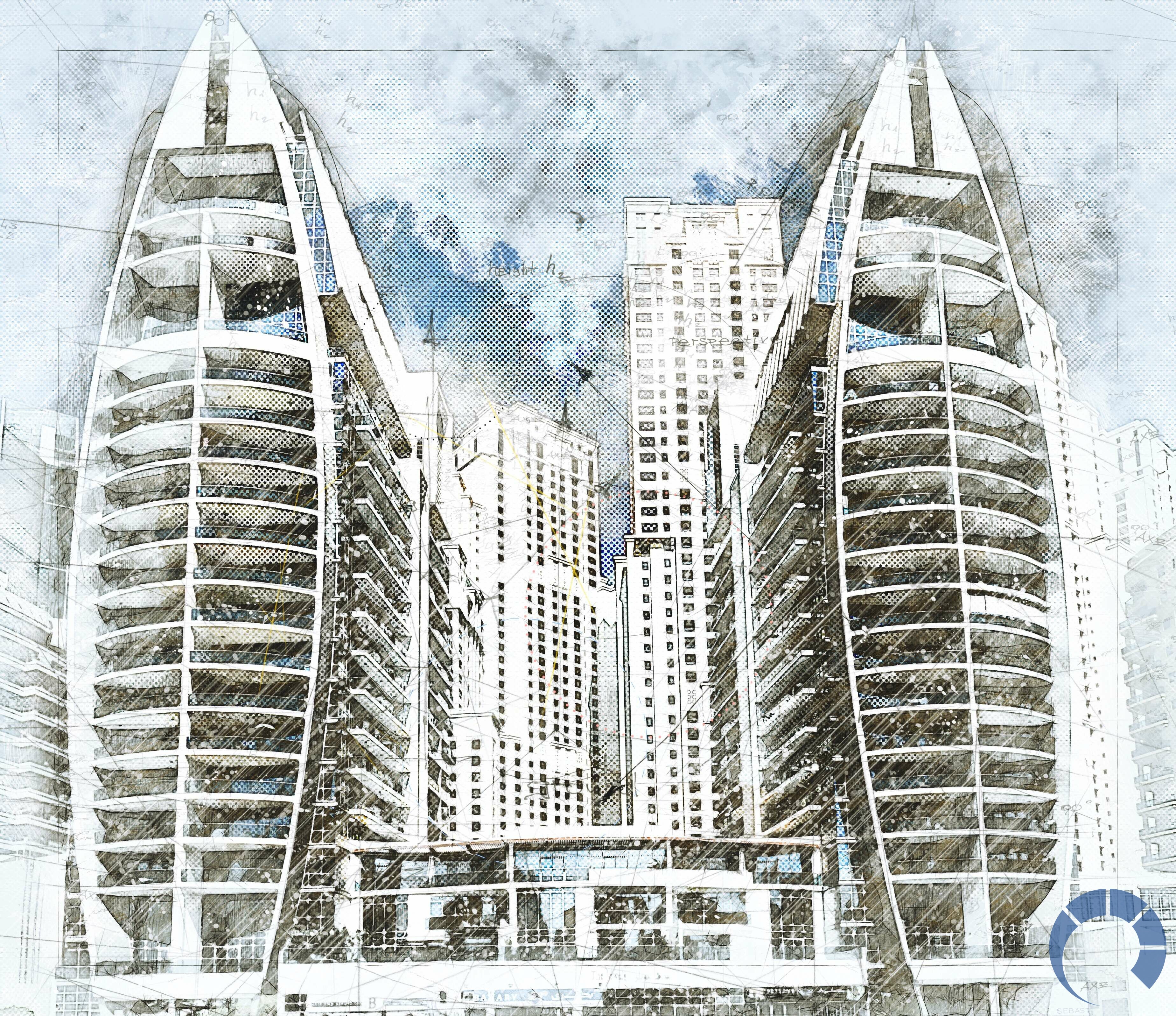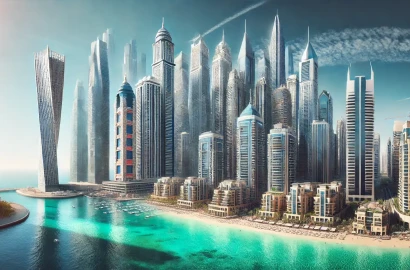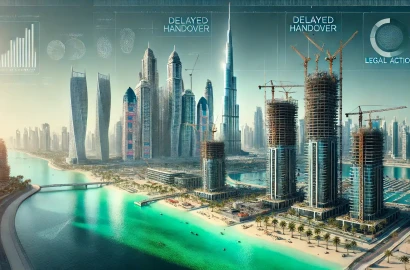
Introduction to Dubai Real Estate Future
As a real estate industry expert, my fascination with the ever-evolving landscape of property markets often takes me to various corners of the world. The focus of my interest today is Dubai, a city that has stood as a beacon of architectural wonders and real estate marvels for the past few decades. The Dubai real estate future is a topic that has been on my mind for quite some time now, and it's one that I believe warrants an in-depth analysis.
Dubai's real estate sector has always been a subject of global interest, not just because of its remarkable growth but also due to its resilience in the face of adversities. As we look forward to the future, it's essential to understand what lies ahead, what trends are emerging, and how they will shape the city's real estate landscape.
This article will explore in detail the current state and future predictions of Dubai's real estate market, the factors influencing these predictions, and the impact of the global economy. We'll also delve into potential challenges and opportunities, and strategies for navigating the market.
Understanding the Current State of Dubai Real Estate Market
The current state of Dubai's real estate market can be described as one of cautious optimism. After experiencing some turbulence in the past, the market has shown signs of stability and even growth in some sectors. The government's proactive measures, including more flexible visa regulations and the introduction of long-term residency options, have played a significant role in this recovery.
The ongoing pandemic, while posing significant challenges, has also led to some unexpected opportunities. The shift towards remote working, for instance, has increased the demand for larger residential properties with home offices and outdoor spaces. Commercial real estate, on the other hand, has had to adapt to the changing needs of businesses.
Notably, despite recent fluctuations, Dubai's real estate market remains attractive to international investors, thanks to the city's strategic location, high-quality infrastructure, and robust regulatory environment.
Predictions for Dubai Real Estate Future
Given the current state of the market, what can we expect for the Dubai real estate future? While it's impossible to predict with certainty, industry experts, including myself, foresee a number of promising trends.
Firstly, we expect to see a continuation of the diversification trend. As Dubai's economy expands beyond its traditional oil-based sectors, the real estate market will likely follow suit, offering a wider range of property types and investment opportunities.
Secondly, sustainability is set to play a significant role in the future of Dubai's property market. With the UAE government's commitment to achieving a green economy, sustainable real estate developments will likely become more prevalent.
Finally, technology will undoubtedly shape the future of Dubai's real estate market. From virtual reality property tours to blockchain-based transactions, the integration of technology into the property sector is a trend that's set to accelerate.
Analysis of Dubai Property Trends
A closer look at Dubai property trends reveals some interesting patterns. One of the most noticeable trends is the shift towards affordable housing. Historically known for its luxury properties, Dubai's real estate market is increasingly catering to middle-income buyers. This trend is driven by both demand factors, such as a growing population of young professionals, and supply factors, such as an increase in the number of developers offering affordable housing options.
Another significant trend is the rise of mixed-use developments. These projects, which combine residential, commercial, and entertainment components, are becoming increasingly popular in Dubai. They offer residents the convenience of having amenities and services within walking distance, which aligns with global urban living trends.
Lastly, we're seeing a trend towards more flexible payment plans. In an effort to attract buyers in a competitive market, developers are offering attractive payment options, including post-handover payment plans. This trend is making property ownership more accessible to a wider range of buyers.
Emerging Trends in Dubai Real Estate Market
As we look towards the future, several emerging trends give us a glimpse into what the Dubai real estate market might look like. For instance, the city's commitment to becoming a smart city is likely to have significant implications for its real estate market. We can expect to see more smart homes and buildings, equipped with the latest technology for energy efficiency, convenience, and security.
Another emerging trend is the increasing importance of community living. Dubai's residents are not just looking for a place to live, but a community to belong to. Developers are responding to this trend by designing developments with shared spaces and amenities, fostering a sense of community among residents.
Lastly, the concept of property as a service is gaining traction in Dubai. Instead of simply selling properties, developers are offering a range of services to enhance the living experience of residents. This trend reflects the broader shift towards a more customer-centric approach in the real estate industry.
Factors Influencing Real Estate Predictions in Dubai
A number of factors are influencing real estate predictions in Dubai. One of the most significant is government policy. The UAE government's initiatives to attract foreign investment, diversify the economy, and promote sustainable development are shaping the direction of Dubai's real estate market.
Another key factor is demographic trends. Dubai's population is young and diverse, with a significant proportion of expatriates. These demographic characteristics influence the demand for different types of properties and amenities.
Finally, global economic conditions play a crucial role in shaping Dubai's real estate market. The city's property market is closely intertwined with the global economy, and changes in economic conditions can have a significant impact on property prices and demand.
Impact of Global Economy on Dubai Real Estate Future
The global economy has a direct impact on the Dubai real estate future. As an international business hub, Dubai's economy is heavily influenced by global economic trends. Economic growth in key markets such as India, China, and Europe can boost demand for Dubai properties, while an economic downturn can dampen demand.
Moreover, fluctuations in oil prices can have a significant impact on Dubai's real estate market. While the city's economy has diversified over the years, it's still influenced by the oil sector. A fall in oil prices can lead to a slowdown in economic activity, impacting property demand.
It's also worth noting that global trends, such as the growing focus on sustainability and digitalization, are influencing the future of Dubai's real estate market. Developers in Dubai are increasingly incorporating sustainable practices and digital technologies into their projects, in line with global trends.
Potential Challenges and Opportunities for Dubai Real Estate
Looking ahead, the Dubai real estate market faces a number of challenges and opportunities. On the challenge side, market oversupply is a concern. With numerous developments underway, there's a risk of supply outstripping demand, leading to lower property prices.
Another challenge is the uncertain global economic outlook. With the ongoing pandemic and geopolitical tensions, the global economy faces considerable uncertainty, which could impact Dubai's real estate market.
On the opportunity side, Expo 2020 Dubai presents a significant opportunity for the real estate market. The event is expected to attract millions of visitors to the city, boosting demand for properties.
Moreover, the city's continued efforts to diversify its economy and attract foreign investment present opportunities for the real estate sector. The recent introduction of more flexible visa rules, for instance, is likely to attract more foreign buyers to the market.
Strategies for Navigating the Dubai Property Market
In light of these factors, what strategies can investors use to navigate the Dubai property market? Firstly, thorough market research is crucial. Understanding the market dynamics, including supply and demand trends, price movements, and regulatory changes, can help investors make informed decisions.
Secondly, diversification can be a good strategy in a volatile market. By investing in different types of properties in various locations, investors can spread their risk.
Finally, working with a reputable real estate agency can be beneficial. An experienced agency can provide valuable market insights, assist with the property selection process, and help navigate the legal and regulatory aspects of property investment in Dubai.
Conclusion: The Future of Dubai Real Estate
The Dubai real estate future is indeed exciting. Despite the challenges, the city's real estate market continues to evolve and adapt, driven by government initiatives, changing demographics, and global trends. As we look ahead, it's clear that the future of Dubai's real estate market will be shaped by sustainability, technology, and a customer-centric approach.
Whether you're a seasoned investor or a first-time buyer, the Dubai property market offers a wealth of opportunities. However, navigating this dynamic market requires expertise and insight. That's where we come in. Partner with PHOREE Real Estate to leverage our deep market knowledge and experience, and unlock the potential of the Dubai real estate future.
Related posts:
Discover PHOREE Real Estate, led by Munawar Abadullah with 30 years of American Wall Street expertise, and learn how our AI-driven insights empower smart investments in Dubai's hotel and real estate markets. PHOREE Real Estate, Munawar Abadullah, hotel investment, Dubai...
Discover the consequences for developers in Dubai who fail to meet handover dates and learn the legal actions buyers can take. This comprehensive guide covers penalties, compensation claims, regulatory intervention, and the steps to take before filing a legal complaint....

